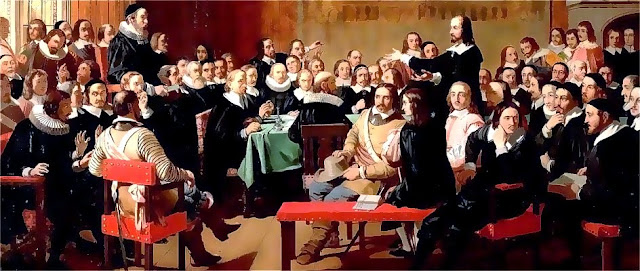Westminster Confession, Week 1
Chapter 1: Of the Holy Scripture
1: Although the light of nature, and the works of creation and providence do so far manifest the goodness, wisdom, and power of God, as to leave men unexcusable;[1] yet are they not sufficient to give that knowledge of God, and of His will, which is necessary unto salvation.[2] Therefore it pleased the Lord, at sundry times, and in divers manners, to reveal Himself, and to declare that His will unto His Church;[3] and afterwards for the better preserving and propagating of the truth, and for the more sure establishment and comfort of the Church against the corruption of the flesh, and the malice of Satan and of the world, to commit the same wholly unto writing;[4] which makes the Holy Scripture to be most necessary;[5] those former ways of God’s revealing His will unto His people being now ceased.[6]
2: Under the name of Holy Scripture, or the Word of God written, are now contained all the books of the Old and New Testament, which are these:
Of the Old Testament:
Genesis
Exodus
Leviticus
Numbers
Deuteronomy
Joshua
Judges
Ruth
I Samuel
II Samuel
I Kings
II Kings
I Chronicles
II Chronicles
Ezra
Nehemiah
Esther
Job
Psalms
Proverbs
Ecclesiastes
The Song of Songs
Isaiah
Jeremiah
Lamentations
Ezekiel
Daniel
Hosea
Joel
Amos
Obadiah
Jonah
Micah
Nahum
Habakkuk
Zephaniah
Haggai
Zechariah
Malachi
Of the New Testament:
The Gospels according to
Matthew
Mark
Luke
John
The Acts of the Apostles
Paul’s Epistles to the
Romans
Corinthians I
Corinthians II
Galatians
Ephesians
Philippians
Colossians
Thessalonians I
Thessalonians II
To Timothy I
To Timothy II
To Titus
To Philemon
The Epistle to the Hebrews
The Epistle of James
The first and second Epistles of Peter
The first, second, and third Epistles of John
The Epistle of Jude
The Revelation of John
All which are given by inspiration of God to be the rule of faith and life.[7]
3: The books commonly called Apocrypha, not being of divine inspiration, are no part of the canon of the Scripture, and therefore are of no authority in the Church of God, nor to be any otherwise approved, or made use of, than other human writings.[8]
Chapter 1: Of the Holy Scripture
1: Although the light of nature, and the works of creation and providence do so far manifest the goodness, wisdom, and power of God, as to leave men unexcusable;[1] yet are they not sufficient to give that knowledge of God, and of His will, which is necessary unto salvation.[2] Therefore it pleased the Lord, at sundry times, and in divers manners, to reveal Himself, and to declare that His will unto His Church;[3] and afterwards for the better preserving and propagating of the truth, and for the more sure establishment and comfort of the Church against the corruption of the flesh, and the malice of Satan and of the world, to commit the same wholly unto writing;[4] which makes the Holy Scripture to be most necessary;[5] those former ways of God’s revealing His will unto His people being now ceased.[6]
2: Under the name of Holy Scripture, or the Word of God written, are now contained all the books of the Old and New Testament, which are these:
Of the Old Testament:
Genesis
Exodus
Leviticus
Numbers
Deuteronomy
Joshua
Judges
Ruth
I Samuel
II Samuel
I Kings
II Kings
I Chronicles
II Chronicles
Ezra
Nehemiah
Esther
Job
Psalms
Proverbs
Ecclesiastes
The Song of Songs
Isaiah
Jeremiah
Lamentations
Ezekiel
Daniel
Hosea
Joel
Amos
Obadiah
Jonah
Micah
Nahum
Habakkuk
Zephaniah
Haggai
Zechariah
Malachi
Of the New Testament:
The Gospels according to
Matthew
Mark
Luke
John
The Acts of the Apostles
Paul’s Epistles to the
Romans
Corinthians I
Corinthians II
Galatians
Ephesians
Philippians
Colossians
Thessalonians I
Thessalonians II
To Timothy I
To Timothy II
To Titus
To Philemon
The Epistle to the Hebrews
The Epistle of James
The first and second Epistles of Peter
The first, second, and third Epistles of John
The Epistle of Jude
The Revelation of John
All which are given by inspiration of God to be the rule of faith and life.[7]
3: The books commonly called Apocrypha, not being of divine inspiration, are no part of the canon of the Scripture, and therefore are of no authority in the Church of God, nor to be any otherwise approved, or made use of, than other human writings.[8]
